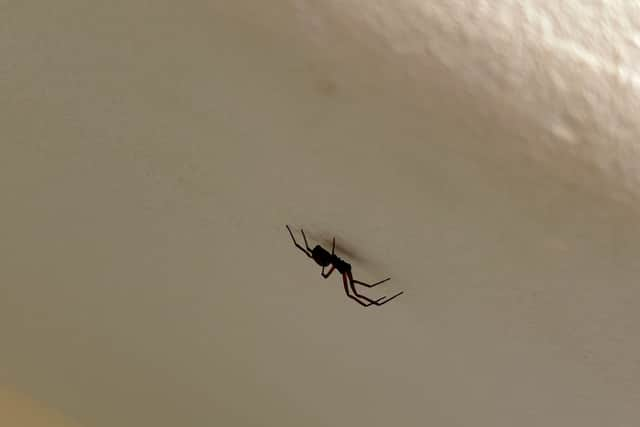Why you should share your house with spiders - as insects start to wake up from winter slumber
and live on Freeview channel 276
It might still technically be winter, but it seems many insects are starting to stir from their cold season slumber.
Here in South London, slugs and snails are already making their epic cross-pavement pilgrimages on rainy nights, and the odd sluggish ladybird can be seen pottering about in the garden. Friendly house spiders have also started to emerge from the nooks and crannies they tucked themselves away in after Autumn's spider season.
Advertisement
Hide AdAdvertisement
Hide AdFor the last few days, I've shared my kitchen with a pretty little male false widow spider. He's missing a leg, and he's got a funny little pattern on his abdomen which looks almost like a skull (ominous), although Google has assured me their bites are not particularly dangerous to humans. While he does wander around a bit, he always manages to stay a respectful distance from any of the flat's human occupants - which is most considerate of him.


As recently as a few years ago, I would have been revolted to share a house with a spider. They creeped me out - their movements were too sudden, too erratic, and their multitude of legs and eyes seemed utterly alien. I would always try to catch and release them outside as a kindness, but it was always a pulse pounding ordeal. But the more I've come to learn about them over the years, the more I've started to respect and even appreciate them, and the weaker my fear has become.
False widows as clever little fellows who can punch well above their weight class when it comes to hunting. They're only seven to 14 millimetres long, but will happily hunt flies, centipedes, or wasps - and occasionally much larger prey. Unfortunately they're also non-native to the British Isles, and my little friend is a male - meaning rather than stay put his whole life, he'll soon scuttle off in search of a mate.
But there are plenty of native British spiders who also perform a fabulous in-house pest control service. Tiny, adorable zebra jumping spiders are so small they've never triggered any arachnophobia in me, and these little guys are more than happy to set up shop on a quiet windowsill, picking off pesky fruit flies, fungus gnats, and mosquitos.
Advertisement
Hide AdAdvertisement
Hide AdThese tiny predators and their compatriots are helping us out in a number of ways. By getting rid of flies, earwigs, fabric-munching moths, and even cockroaches, they help prevent them laying eggs, defecating (or leaving insect 'frass' lying about), and potentially contaminating food or spreading disease. Many will just set up a web or hunting ground in a high insect traffic area, and you can just leave them to it.
Of the hundreds of species of spider that call the UK home, most are far too small to be of any harm to us - and while a few can cause a painful bite (a rare occurrence), there are no species considered deadly. That old adage about spiders being more scared of us than we are of them is largely true, and it's perfectly possible to just peacefully co-exist.
Further, while our well-meaning attempts to put them outside are better than nothing - and completely understandable if you're severely arachnophobic - it can unfortunately be a death sentence for the little guys. Their ancestors have probably lived in and around your house for generations, and they're not adapted for living in the outdoors - particularly while it's still so cold out.
Next time you see a spider minding its own business in a quiet corner, maybe consider letting it stay. It can be a beneficial arrangement for both of you, and you might even find you come to like these so-called 'creepy crawlies' more than you thought you ever would.
Comment Guidelines
National World encourages reader discussion on our stories. User feedback, insights and back-and-forth exchanges add a rich layer of context to reporting. Please review our Community Guidelines before commenting.
